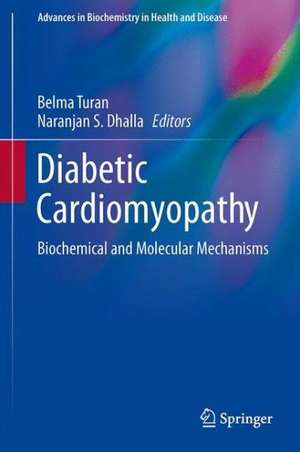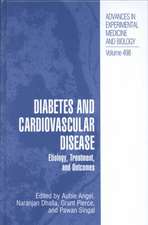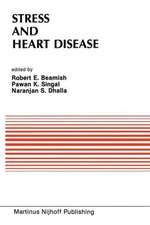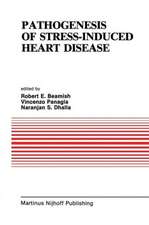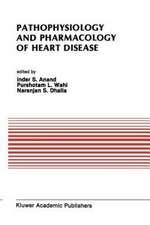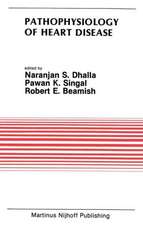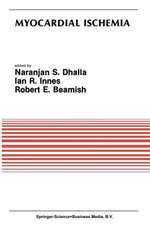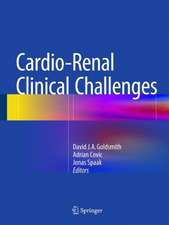Diabetic Cardiomyopathy: Biochemical and Molecular Mechanisms: Advances in Biochemistry in Health and Disease, cartea 9
Editat de Belma Turan, Naranjan S. Dhallaen Limba Engleză Hardback – 9 ian 2014
Diabetic Cardiomyopathy: Biochemical and Molecular Mechanisms is a compilation of review articles devoted to the study on the topic with respect to biochemical and molecular mechanisms of hyperglycaemia. The wide range of areas covered here is of interest to basic research scientists, clinicians and graduate students, who are devoted to study the pathogenesis of diabetes-induced cardiovascular dysfunction. Furthermore, some chapters are directed towards increasing our understanding of novel ways for the prevention/treatment of cardiomyopathy.
Twenty five articles in this book are organized in three sections. The first section discusses general aspects of the metabolic derangements in diabetic cardiomyopathy including metabolic alterations and substrate utilization as well as cardiac remodelling in the heart; role of diet in the development of metabolic syndrome in the heart; effect of hyperglycaemia in terms of biochemical and structural alterations in heart. In the second section, several cellular and molecular mechanisms are discussed indicating that diabetic cardiomyopathy is a multifactorial and complex problem. The third section discusses the prevention and treatment of diabetes using appropriate diet, proper supplements including antioxidants, angiotensin inhibitors and some other drugs. All in all, this book discusses the diverse mechanisms of diabetic cardiomyopathy with some information on new therapeutic approaches for finding solutions to prevent or reverse the development of cardiac dysfunction.
| Toate formatele și edițiile | Preț | Express |
|---|---|---|
| Paperback (1) | 951.14 lei 6-8 săpt. | |
| Springer – 23 aug 2016 | 951.14 lei 6-8 săpt. | |
| Hardback (1) | 1116.73 lei 6-8 săpt. | |
| Springer – 9 ian 2014 | 1116.73 lei 6-8 săpt. |
Din seria Advances in Biochemistry in Health and Disease
- 18%
 Preț: 1241.55 lei
Preț: 1241.55 lei - 5%
 Preț: 1290.27 lei
Preț: 1290.27 lei - 5%
 Preț: 1291.01 lei
Preț: 1291.01 lei - 5%
 Preț: 1103.75 lei
Preț: 1103.75 lei - 5%
 Preț: 1430.35 lei
Preț: 1430.35 lei - 18%
 Preț: 1126.52 lei
Preț: 1126.52 lei - 15%
 Preț: 647.40 lei
Preț: 647.40 lei - 5%
 Preț: 1107.21 lei
Preț: 1107.21 lei - 18%
 Preț: 958.07 lei
Preț: 958.07 lei - 18%
 Preț: 1237.48 lei
Preț: 1237.48 lei - 18%
 Preț: 957.94 lei
Preț: 957.94 lei - 5%
 Preț: 1213.81 lei
Preț: 1213.81 lei - 24%
 Preț: 898.20 lei
Preț: 898.20 lei - 5%
 Preț: 670.96 lei
Preț: 670.96 lei - 18%
 Preț: 1225.48 lei
Preț: 1225.48 lei - 24%
 Preț: 835.49 lei
Preț: 835.49 lei - 5%
 Preț: 1025.16 lei
Preț: 1025.16 lei - 18%
 Preț: 1121.62 lei
Preț: 1121.62 lei - 5%
 Preț: 1018.46 lei
Preț: 1018.46 lei - 5%
 Preț: 1108.35 lei
Preț: 1108.35 lei - 5%
 Preț: 1320.06 lei
Preț: 1320.06 lei - 5%
 Preț: 1104.48 lei
Preț: 1104.48 lei - 5%
 Preț: 1114.91 lei
Preț: 1114.91 lei - 5%
 Preț: 1388.54 lei
Preț: 1388.54 lei - 5%
 Preț: 1321.47 lei
Preț: 1321.47 lei - 18%
 Preț: 964.71 lei
Preț: 964.71 lei - 5%
 Preț: 1119.47 lei
Preț: 1119.47 lei
Preț: 1116.73 lei
Preț vechi: 1175.51 lei
-5% Nou
Puncte Express: 1675
Preț estimativ în valută:
213.68€ • 223.12$ • 176.45£
213.68€ • 223.12$ • 176.45£
Carte tipărită la comandă
Livrare economică 15-29 aprilie
Preluare comenzi: 021 569.72.76
Specificații
ISBN-13: 9781461493167
ISBN-10: 1461493161
Pagini: 400
Ilustrații: XIX, 416 p. 64 illus., 38 illus. in color.
Dimensiuni: 155 x 235 x 27 mm
Greutate: 0.98 kg
Ediția:2014
Editura: Springer
Colecția Springer
Seria Advances in Biochemistry in Health and Disease
Locul publicării:New York, NY, United States
ISBN-10: 1461493161
Pagini: 400
Ilustrații: XIX, 416 p. 64 illus., 38 illus. in color.
Dimensiuni: 155 x 235 x 27 mm
Greutate: 0.98 kg
Ediția:2014
Editura: Springer
Colecția Springer
Seria Advances in Biochemistry in Health and Disease
Locul publicării:New York, NY, United States
Public țintă
ResearchCuprins
Cardiac defects in diabetes.- Hormonal imbalance and neuropathy.- Role of oxidative stress.- Role of cation channel defects.- Abnormalities in glucose transport.- Fatty acid utilization.- Sarcolemmal Na+-K+ ATPase.- Sarcolemmal Ca2+-transport.- Sarcoplasmic reticular Ca2+-transport.- Intracellular Ca2+-homeostasis.- Mitochondrial function.- Contractile proteins.- β-adrenoceptor mechanisms.- Protein kinases and signal transduction.- Regulation of phopholipases.- Endothelin defects and cardiac dysfunction.- Metabolic changes in smooth muscles.- Metabolic defects in skeletal muscles.- Metabolic defects in brain.- Role of microangiopathy in heart dysfunction.- Role of nephropathy in heart dysfunction.- Prevention of diabetic-induced cardiac dysfunction.- Molecular targets for the therapy of diabetic cardiomyopathy.
Recenzii
From the book reviews:
“Cardiovascular disease occurs also, but rarely, in late adolescence and young adults, depending on age at onset of disease and degree of metabolic control. Thus, this well referenced and up to date text is mainly of interest to adult diabetologists , cardiologists and researchers.” (Pediatric Endocrinology Reviews (PER), Vol. 12 (1), September, 2014)
“Cardiovascular disease occurs also, but rarely, in late adolescence and young adults, depending on age at onset of disease and degree of metabolic control. Thus, this well referenced and up to date text is mainly of interest to adult diabetologists , cardiologists and researchers.” (Pediatric Endocrinology Reviews (PER), Vol. 12 (1), September, 2014)
Notă biografică
Dr. Belma Turan is Professor of Biophysics, Faculty of Medicine at the Ankara University, Ankara, Turkey. Her research interest and expertise include electrophysiology of cardiovascular system, intracellular ion homeostasis, oxidative stress as well as antioxidant defense with respect to gender difference and diabetic cardiomyopathy. She has been engaged in teaching and research in heath and disease for the past 25 years.
Dr. Naranjan Dhalla is Distinguished Professor at the University of Manitoba, Winnipeg, Canada. His expertise includes the subcellular and molecular basis of heart function in health and disease. He has been engaged in multidisciplinary research in ischemic heart disease and heart failure as well as education for promoting scientific basis cardiology and training of professional manpower for combating heart disease for over 40 years.
Dr. Naranjan Dhalla is Distinguished Professor at the University of Manitoba, Winnipeg, Canada. His expertise includes the subcellular and molecular basis of heart function in health and disease. He has been engaged in multidisciplinary research in ischemic heart disease and heart failure as well as education for promoting scientific basis cardiology and training of professional manpower for combating heart disease for over 40 years.
Textul de pe ultima copertă
Diabetes has long been recognized as a disease of high blood sugar, and there has been a continuous search of the exact reason for its development and effective treatment. In 2005, the World Health Organization had estimated that more than 180 million people worldwide suffer from diabetes mellitus and indicated that this figure is likely to double within the next 20 years. Among the 3.8 million deaths each year associated with diabetes, about two thirds are attributable to cardiovascular complications, and diabetes is now considered to be a major metabolic risk factor for the occurrence of heart disease.
Diabetic Cardiomyopathy: Biochemical and Molecular Mechanisms is a compilation of review articles devoted to the study on the topic with respect to biochemical and molecular mechanisms of hyperglycaemia. The wide range of areas covered here is of interest to basic research scientists, clinicians and graduate students, who are devoted to study the pathogenesis of diabetes-induced cardiovascular dysfunction. Furthermore, some chapters are directed towards increasing our understanding of novel ways for the prevention/treatment of cardiomyopathy.
Twenty five articles in this book are organized in three sections. The first section discusses general aspects of the metabolic derangements in diabetic cardiomyopathy including metabolic alterations and substrate utilization as well as cardiac remodelling in the heart; role of diet in the development of metabolic syndrome in the heart; effect of hyperglycaemia in terms of biochemical and structural alterations in heart. In the second section, several cellular and molecular mechanisms are discussed indicating that diabetic cardiomyopathy is a multifactorial and complex problem. The third section discusses the prevention and treatment of diabetes using appropriate diet, proper supplements including antioxidants, angiotensin inhibitors and some other drugs. All in all, this book discusses thediverse mechanisms of diabetic cardiomyopathy with some information on new therapeutic approaches for finding solutions to prevent or reverse the development of cardiac dysfunction.
Diabetic Cardiomyopathy: Biochemical and Molecular Mechanisms is a compilation of review articles devoted to the study on the topic with respect to biochemical and molecular mechanisms of hyperglycaemia. The wide range of areas covered here is of interest to basic research scientists, clinicians and graduate students, who are devoted to study the pathogenesis of diabetes-induced cardiovascular dysfunction. Furthermore, some chapters are directed towards increasing our understanding of novel ways for the prevention/treatment of cardiomyopathy.
Twenty five articles in this book are organized in three sections. The first section discusses general aspects of the metabolic derangements in diabetic cardiomyopathy including metabolic alterations and substrate utilization as well as cardiac remodelling in the heart; role of diet in the development of metabolic syndrome in the heart; effect of hyperglycaemia in terms of biochemical and structural alterations in heart. In the second section, several cellular and molecular mechanisms are discussed indicating that diabetic cardiomyopathy is a multifactorial and complex problem. The third section discusses the prevention and treatment of diabetes using appropriate diet, proper supplements including antioxidants, angiotensin inhibitors and some other drugs. All in all, this book discusses thediverse mechanisms of diabetic cardiomyopathy with some information on new therapeutic approaches for finding solutions to prevent or reverse the development of cardiac dysfunction.
Caracteristici
Provides an in-depth analysis of biochemical and molecular mechanisms of cardiac dysfunction in diabetic cardiomyopathy Contains state-of-the-art reviews from leading experts all over the world in the area of cardiac dysfunction Emphasizes molecular, subcellular, and signal transduction mechanisms of contractile dysfunction in chronic diabetes Includes supplementary material: sn.pub/extras
